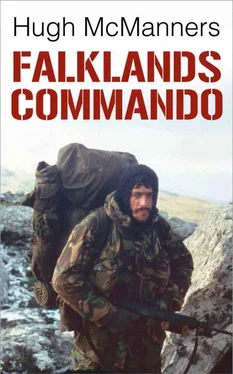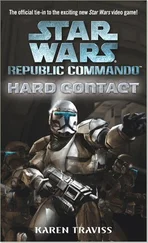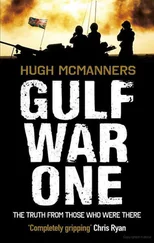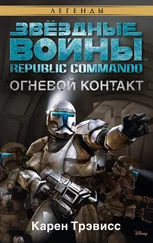Hugh McManners - Falklands Commando
Здесь есть возможность читать онлайн «Hugh McManners - Falklands Commando» весь текст электронной книги совершенно бесплатно (целиком полную версию без сокращений). В некоторых случаях можно слушать аудио, скачать через торрент в формате fb2 и присутствует краткое содержание. Город: London, Год выпуска: 2014, ISBN: 2014, Издательство: Nightstrike Publishing, Жанр: nonf_military, Биографии и Мемуары, на английском языке. Описание произведения, (предисловие) а так же отзывы посетителей доступны на портале библиотеки ЛибКат.
- Название:Falklands Commando
- Автор:
- Издательство:Nightstrike Publishing
- Жанр:
- Год:2014
- Город:London
- ISBN:978-0-992-81540-0
- Рейтинг книги:4 / 5. Голосов: 1
-
Избранное:Добавить в избранное
- Отзывы:
-
Ваша оценка:
- 80
- 1
- 2
- 3
- 4
- 5
Falklands Commando: краткое содержание, описание и аннотация
Предлагаем к чтению аннотацию, описание, краткое содержание или предисловие (зависит от того, что написал сам автор книги «Falklands Commando»). Если вы не нашли необходимую информацию о книге — напишите в комментариях, мы постараемся отыскать её.
Falklands Commando — читать онлайн бесплатно полную книгу (весь текст) целиком
Ниже представлен текст книги, разбитый по страницам. Система сохранения места последней прочитанной страницы, позволяет с удобством читать онлайн бесплатно книгу «Falklands Commando», без необходимости каждый раз заново искать на чём Вы остановились. Поставьте закладку, и сможете в любой момент перейти на страницу, на которой закончили чтение.
Интервал:
Закладка:
So when my family suggested I might write a book about my adventures, I took the idea as an opportunity to tell the whole story as it really was, which might also save me from having continually to explain. But more importantly, so I could present an accurate picture of what it was really like, for all these people whose ignorance was so shaped by media nonsense.
Director of Army Public Relations Brigadier David Ramsbotham would have to clear such a book before it could be published, but being about Special Forces operations, would it not be banned?
I already knew Brigadier Ramsbotham was a man worth talking to: General Tim was his senior reporting officer and I’d proof read his latest Confidential Report. Brigadier Ramsbotham’s Civil Service bosses had been very much less than complimentary, and I’d been struck by the dramatic economy of my boss’s pen picture contradiction: “Doves which spend their days contentedly saying ‘Too-roo Too-roo’ to each other, do not appreciate the sudden arrival of a cat which upsets their comfortable lives and gets things done.”
Brigadier David was a regular caller on General Tim, so with some trepidation I asked him privately if I might write a book. His response was unequivocal: “If only you would. We’d love to see something by a soldier to counter all these books being rushed out by journalists. What you did was history, so write about it. Give it to me and I’ll get it cleared.”
I was also greatly encouraged in this alarming project by General Tim who, when I finally finished the writing, read my first draft on one of his rare weekends off. (I predict incredulity from military officers with MoD experience.)
Brigadier David Ramsbotham:
“Fewer and fewer people now have experience, let alone understanding, of real, full-on war, which nevertheless remains a subject of endless fascination, hence the continued popularity of films, TV programmes, books and comic strips. One of the reasons I encouraged Hugh McManners to write Falklands Commando , was that he wanted to tell things as they were rather than hide behind bland innuendo. I wanted the public to be exposed to the real thing, not dramatised but honestly described, to counter-balance this diet of sensation and unreality with which the British public was otherwise being bombarded by the media. But most of this is so far removed from reality as to distort the understanding of what it’s really like to be in action, when one’s life and the lives of one’s comrades-in-arms, are at risk.”
After a couple of months working in the MoD, with my book-writing underway, one Friday afternoon I was summoned across the corridor to General Tim’s office to be told I’d been awarded a Mention in Despatches (MiD), the UK’s lowest level of gallantry award. I was stunned, as I truly felt I didn’t deserve anything like this.
Then came a flood of official letters of congratulation, some of which I found irritating as they were so obviously routine. I wrote personal replies to all except one that I found too unbearably platitudinous. I suspect that some of my replies would have been oddly received, in particular the one I recall writing to the Director Royal Artillery about the technicalities of shelling Argentine artillery batteries and killing their gun crews.
Later, I was summoned to the office of his successor Major General Brian Pennicott, a previous CO of 29 Commando, who’d commanded all the artillery in the Falklands and I knew very well. He confided to me that I’d been recommended for a Military Cross, but that because 148 Battery was so small, there was a quota and only the one could be awarded (as rightly it had been, to fellow NGSFO team leader Captain Willie McCracken). This disoriented me, and I probably reacted strangely to General Brian, because I just could not see how I personally might have deserved that level of recognition.
I did nevertheless feel very proud that FO1’s team effort had been recognised through my MiD, and wrote each to Nick, Des, Steve and Tim along those lines. However later, I realised this is what everybody does, which made me feel even more fraudulent.
I was working very hard: running into the MoD from my new lodgings in Stockwell, doing an exercise session in the gym, then changing into my pinstripe suit to be behind the desk for 7am to get things ready for when the Military Assistant Lt Colonel Tony Piggot and General Tim arrived. I usually ran home around twelve hours later, and after a shower and supper, settled down to work on my diary – which was to become the Falklands Commando manuscript. I found this cathartic and relaxing.
And so we leave the young Captain McManners working all hours for five days a week in Whitehall, then departing as soon as he could on Fridays to his bolthole in St Agnes on the north coast of Cornwall.
I hope you will wish to continue reading my next autobiographical volume.
I’m now writing it, while trying to come to terms with the uncomfortable level of self-exposure publication will entail.
But this will tell a story that many others have also experienced, of the aftermath of war. In my version of this story, you will read of counter-terrorist work in Northern Ireland, high altitude mountaineering in the Chinese Karakoram, then via a High Court case and other twists and turns, to the establishment of a medical research foundation at the University of Oxford, focussed on the psychological and neurological problems suffered by war veterans.
You will also read of the gradual emergence of understanding of these problems, and the herculean struggles of war veterans to come to terms with surviving war then coping with the peace.
A story of suffering, but also of hope. I’m very grateful to you for reading this far. I hope you will continue…
Falklands War Outline Chronology of Events
1 April
Rumours start concerning an invasion of the Falkland Islands.
148 Battery recalled from leave.
Warning Order for operations issued.
2 April
Argentina invades the Falkland Islands.
4 April
RFA Sir Percivale sails from Marchwood.
5 April
Hermes/Invincible carrier group sails from Portsmouth, preceded by Fearless .
9 April
3 Commando Brigade sails on board Canberra .
10 April
Former US General and President Reagan’s’ Secretary of State Alexander Haig arrives in Buenos Aires, from London.
12 April
A Maritime Exclusion Zone comes into operation around Falkland Islands.
15 April
Royal Navy destroyer group arrives on station in mid-Atlantic (a submarine is already on station in the area of the Falklands).
17 April
Naval and land force planning conferences held at Ascension.
Alexander Haig returns to Buenos Aires, after visits to London and Washington.
18 April
Argentine aircraft-carrier 25 Mayo returns to port for repairs.
22 April
British Foreign Secretary Francis Pym to Washington.
24 April
Admiral Woodward’s naval task group arrives in the South Atlantic and RVs with the destroyer group.
25 April
South Georgia recaptured by an ad hoc British force using 148 Battery-directed naval gunfire.
29 April
The British Task force arrives at the edge of the Exclusion Zone.
30 April
The Total Exclusion Zone around the Falklands comes in force.
President Reagan promises US support for Britain.
1 May
An initial ‘Black Buck’ Vulcan bombing raid on Port Stanley airfield, followed by Harrier and naval gunfire attacks.
Читать дальшеИнтервал:
Закладка:
Похожие книги на «Falklands Commando»
Представляем Вашему вниманию похожие книги на «Falklands Commando» списком для выбора. Мы отобрали схожую по названию и смыслу литературу в надежде предоставить читателям больше вариантов отыскать новые, интересные, ещё непрочитанные произведения.
Обсуждение, отзывы о книге «Falklands Commando» и просто собственные мнения читателей. Оставьте ваши комментарии, напишите, что Вы думаете о произведении, его смысле или главных героях. Укажите что конкретно понравилось, а что нет, и почему Вы так считаете.












